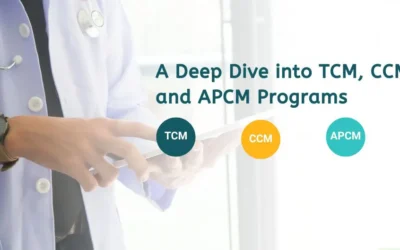
Effective Strategies for Chronic Care Management and Remote Patient Monitoring
The CDC reports that six out of ten Americans suffer from at least one persistent health condition. Therefore, practices need to dedicate numerous hours weekly to condition management and documentation work that satisfies Medicare reimbursement standards.
Understanding Why Practices Frequently Underuse CCM and RPM Services
The implementation of CCM and RPM programs requires your practice to adapt to substantial changes. Implementing new processes requires practice staff to adapt to their operation before they achieve full efficiency in using all available services. The following factors explain this situation:
They fail to incorporate CCM and RPM into their care delivery approach
Medical practices tend to handle CCM and RPM as supplementary services that do not impact their existing operational methods. The providers show reluctance to depend on monitoring services from healthcare providers that would improve patient care.
They resist adapting their communication practices
The alteration of established communication systems and work processes proves challenging to execute. Healthcare staff maintain contact with patients through their patient follow-ups despite having third-party assistance available.
They have overlooked utilizing third-party providers to enhance efficiency
Through their monitoring systems and service models and care coordinator staff CCM and RPM providers offer sophisticated solutions to healthcare providers. The lack of full integration between resources means practices cannot maximize their use of the service.
A lack of effective implementation with your CCM/RPM provider service delivery resembles having an expert who performs only entry-level tasks. The workload exceeds your responsibilities even though you should not be handling it.
Power of CCM and RPM
You should see your provider as a key member of your team to maximize the benefits available from CCM and RPM services. All successful practices we work with implement new processes yet depend on us for consistent delivery of high-quality medical care each month. When providers adopt this new way of thinking they gain access to multiple opportunities for teamwork:
Revamp Communication Workflows– Put your faith in your CCM/RPM provider who will now handle all monthly medical care for your patients. The trained care coordinators at Gen by Gen Health establish patient relationships and track health metrics to fulfill Medicare standards.
Leverage Proactive Monitoring – Your healthcare provider functions as an early detection system and you should trust them to uncover patient information you do not know. Our care coordinators become the first team members to recognize when patients show behavioral changes or exhibit worrying mental states or neglect their care plan. Through their constant data monitoring and scheduled patient check-ins, the care professionals can identify problems at an early stage before severe emergencies develop.
Build an Integrated and Efficient Care Delivery Model– Embed CCM and RPM services into your care delivery framework while letting your service provider function as part of your practice. Your patients receive true value-based care and decreased hospitalizations and ED visits when you use these services successfully.
The combination of services results in better patient experiences while simultaneously boosting organizational operational effectiveness. The development of patient trust between care coordinators and their patients leads patients to actively participate in their care plans and share critical health information.
Gen By Gen Health's turn-key CCM/RPM solutions ensure compliance and health literacy – improving patient satisfaction and outcomes, increasing revenue, and decreasing staff workload.
To get in touch call us right now at (908)-864-0098 to learn more about our CCM services or you can also book a 30 min free consultation.
You may also like
The Power of Patient Engagement in Driving Better Outcomes
Using patient engagement strategies requires intentional action, but the benefits are significant. People engaged in their care usually follow care plans, control their chronic health problems well, and stay in touch with their doctors. When you start focusing on...
Advance Primary Care Management (APCM) and Who Can Bill For It
Advanced Primary Care Management (APCM), which started in 2025, is the latest care management program from CMS. Unlike older care management plans, it supports every Medicare beneficiary, irrespective of how many chronic conditions they have. As APCM is just starting,...
A Deep Dive into TCM, CCM, and APCM Programs
Transitional Care Management (TCM) is a service that allows Medicare to pay for help given to a person transitioning from a hospital to their home. TCM strives to prevent patients from being readmitted in the first 30 days after they leave the hospital. At this point,...



